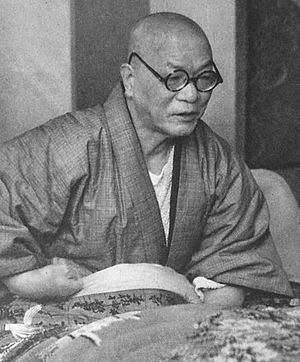Matsutarō Shōriki facts for kids
Quick facts for kids
Matsutarō Shōriki
|
|
|---|---|
| 正力 松太郎 | |

Shōriki in 1955
|
|
| Born | April 11, 1885 Daimon, Toyama, Japan
|
| Died | October 9, 1969 (aged 84) Atami, Shizuoka, Japan
|
| Alma mater | University of Tokyo |
| Occupation | Media mogul, journalist, judo master |
| Employer | president of the Yomiuri Shimbun and the first president of Nippon Television Network Corporation |
| Known for | father of Japanese professional baseball "father of Japanese nuclear power" |
| Children | Tōru Shōriki |
|
Baseball career |
|
| Induction | 1959 |
Matsutarō Shōriki (正力 松太郎, Shōriki Matsutarō, April 11, 1885 – October 9, 1969) was an important Japanese businessman and politician. He owned the Yomiuri Shimbun newspaper. This newspaper became very popular after World War II.
Shōriki also started Japan's first commercial TV station, Nippon Television Network Corporation, in 1952. He was elected to the House of Representatives in 1955. He also became the first head of the Japanese Atomic Energy Commission. Because of his work, he is known as the "father of Japanese nuclear power."
Contents
Biography
Early life and education
Matsutarō Shōriki was born in Daimon, Toyama, Japan. He went to Tokyo Imperial University Law School. While studying, he was also a skilled judoka.
He became one of the most successful judo masters. After he passed away, he received the very rare rank of 10th Dan.
Metropolitan Police
After finishing university in 1913, Shōriki joined the Metropolitan Police. He quickly moved up in the police ranks.
He was involved in police actions against certain groups in June 1923. After the huge 1923 Great Kantō earthquake in September 1923, Shōriki was involved in spreading false information. This led to attacks on Korean and Chinese workers.
He later became the Director of Police Affairs. After an event involving Prince Regent Hirohito in December 1923, Shōriki resigned from his police role.
Yomiuri Shimbun
After leaving the police, Shōriki took over the Yomiuri Shimbun newspaper. The newspaper was not doing well at the time. In 1924, he bought it with help from a powerful investor, Shinpei Goto.
Shōriki made many changes to the newspaper. He improved the news stories and added a full-page guide for radio programs. The newspaper focused on news for people in the Tokyo area. By 1941, it was the most popular daily newspaper in Tokyo.
Baseball
Shōriki is often called the father of Japanese professional baseball. In 1934, he put together a Japanese All-Star team. This team played against an American All-Star team.
Unlike earlier teams that broke up, Shōriki made this group into a professional team. They later became famous as the Yomiuri Giants. Shōriki was even attacked by some people for letting Americans play baseball in Japan. He got a long scar from the attack.
In 1949, Shōriki became the unofficial first leader of Nippon Professional Baseball (NPB). In 1950, he helped change the Japanese Baseball League into its current two-league system. He also helped create the Japan Series, which is like a championship.
Nippon Television Network
Private television started in Japan in the early 1950s. This was partly due to policies from the U.S. occupation. In July 1952, Shōriki received a license to start a new TV station.
This station became the Nippon Television Network (NTV). It was Japan's first commercial television station.
Nuclear power
In January 1956, Shōriki became the head of the new Japanese Atomic Energy Commission. In May of that year, he was also made head of the Science and Technology Agency. The U.S. Central Intelligence Agency (CIA) supported these moves.
In 1957, he joined the government as chairman of the National Public Safety Commission. Around this time, Japan agreed to buy 20 nuclear reactors from the United States of America. Shōriki played a big part in the decision to build many nuclear power plants across Japan.
In 2006, a professor named Tetsuo Arima published an article. It suggested that Shōriki worked with the CIA. The article said he helped set up a pro-U.S. TV network (NTV). It also claimed he helped bring U.S. nuclear power technology to Japan. These claims were based on de-classified documents from the NARA in Washington, DC.
Because of his efforts, Shōriki is also known as "the father of nuclear power."
Death
Matsutarō Shōriki passed away on October 9, 1969, in Atami, Shizuoka.
Tributes
In 1959, Shōriki was the first person to be inducted into the Japanese Baseball Hall of Fame. There is also an award named after him, the Matsutaro Shoriki Award. This award is given every year to someone who has done a lot for Japanese baseball.
The position of Chair of the Department of Asia, Oceania, and Africa at the Museum of Fine Arts, Boston is also named in honor of Shōriki.
See also
 In Spanish: Matsutarō Shōriki para niños
In Spanish: Matsutarō Shōriki para niños
 | John T. Biggers |
 | Thomas Blackshear |
 | Mark Bradford |
 | Beverly Buchanan |

